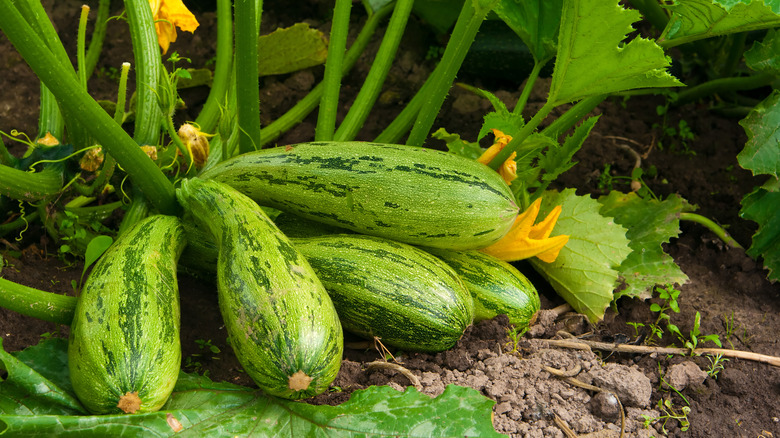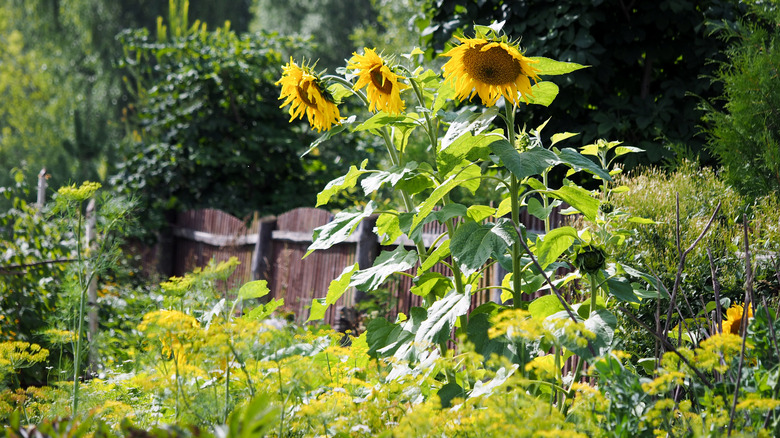You Don't Need A Trellis To Grow Zucchini If You're Planting It Like This
Even for the beginner gardener, zucchinis are a great plant to grow in your garden due to the relative ease of caring for them. That being said, one challenge that gardeners may encounter is the sprawling nature of the plant, often necessitating a trellis or vertical contraption in order to manage space in the garden and support the weight of the growing fruits. While a trellis is a great solution that offers a variety of styling options — wood, wire, or plastic, for example — you could try a natural solution. Sure, a trellis offers the opportunity of a certain Instagrammable aesthetic, but another more sustainable option would be to choose companion planting. Companion planting involves growing crops together that provide symbiotic benefits to one another by cohabitating. In this case, growing zucchinis with sunflowers can provide a natural vertical structure that eliminates the need for a trellis.
Sunflowers are well known for their towering heights and sturdy stalks, but they can also provide support for zucchini vines. Another benefit of choosing this method is that sunflowers attract many pollinators with their enormous blooms, which also significantly increases the health of your zucchini as they require pollinators to produce a decent yield of fruit. Lastly, the broad leaves along the stalk of a sunflower can provide shade for the zucchini plant, discouraging weeds and helping to retain soil moisture for both crops. Thus, this method is a simple and natural way to seek success for both plants in your garden.
How to grow zucchini and sunflowers together
The time has come to ditch your trellis and try companion planting this season. To grow zucchini and sunflowers together, it's best to start by identifying a sunny location in your garden with well-draining soil. Sunflowers need full sun in order to grow strong and tall, and zucchini plants also appreciate ample sunlight to produce abundant fruits. Growing these two plants together requires some planning and knowledge of when to start these crops in your growing zone. Sunflowers can be planted after the last frost and when soil temperatures reach 60 degrees Fahrenheit. Zucchinis are planted later in the season, typically in late spring when the air and soil are consistently above 65 degrees. Both plants can be sown directly in the soil or grown from seedlings.
For spacing, tall varieties of sunflowers should be planted 1 to 2 feet apart. A taller variety would be best for trellising your zucchinis, so look into Russian Mammoth or Skyscraper for a reliable structure. In a row next to the sunflowers, you can plant the zucchinis 6 to 8 inches apart. It would be best to plant the sunflowers and zucchinis about 1 to 2 feet apart so that the vines can easily reach the sunflower stalks for support. As both crops develop, you can gently guide the zucchini vines around the stems of the sunflowers to encourage upward growth for support. Finally, both plants enjoy moist soil, so water them regularly, too.
Additional tips for this method
Utilizing the height of your sunflowers to create a natural trellis for your zucchini plants is a wonderful way to create an organic structure in your garden, encouraging the healthy growth of both plants. You can even bolster this companion planting one step further by adding another symbiotic crop to the mix. One great option is to utilize the benefits of marigolds. You can interplant these flowers with zucchini and sunflowers to repel pests such as nematodes and aphids. At the same time, you'll also attract beneficial insects like ladybugs and additional pollinators.
Something else to remember when planning your garden is to select zucchini and sunflower varieties that are disease-resistant and ideal for your climate. Some varieties are naturally bred for warmer or dryer climates, so it's best to check with a local nursery to determine which exact species will thrive where you live. A couple to keep in mind are disease-resistant zucchini varieties like Black Beauty or Cucurbita Palmata, as they can withstand common fungal pathogens. For sunflower varieties, consider ProCut Orange for its disease resistance.
Finally, it's important to practice healthy gardening habits. While sunflowers and zucchinis are great companion plants, don't plant them in the same spot every year. Instead, practice crop rotation by alternating the location of zucchini and sunflowers each growing season. Rotating crops in your garden helps to prevent soil-borne diseases and to maintain soil fertility by balancing the nutrients in your soil.


